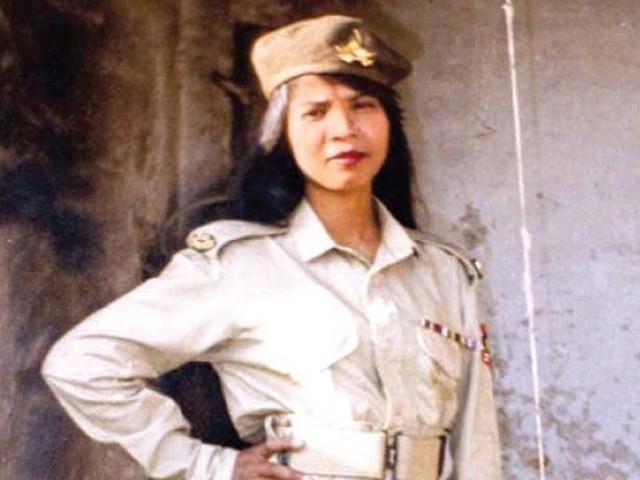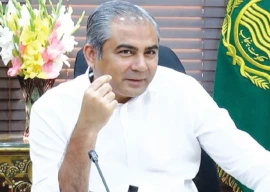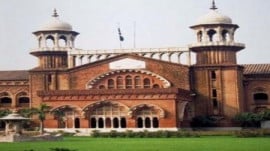
Aasia Bibi, a 51-year-old Christian woman, has been on the death row since November 2010 after she was convicted on charges of committing blasphemy during an argument with two Muslim women in Sheikhupura.
Her case gained prominence after then Punjab governor Salmaan Taseer pleaded for a retrial of her case and was subsequently shot dead by one of his guards, Mumtaz Qadri, in January 2011.
In 2014, the Lahore High Court upheld Aasia's death sentence. However, in July 2015, the Supreme Court stayed her execution.
After a three-year gap, a three-judge special bench, headed by Chief Justice of Pakistan Mian Saqib Nisar and comprising by Justice Asif Saeed Khosa and Justice Mazhar Alam Miankhel, resumed the hearing of the appeal against her conviction on Monday.
The hearing lasted nearly two hours and 45 minutes, during which both prosecution and defence presented their points of view over Aasia's conviction.
Members of civil society, including veteran politician Farhatullah Babar, were in attendance during the proceedings.
Unlike previous hearings, a large number of religious clerics were present inside and outside the courtroom.
However, the bench restrained the media from discussing, publishing or airing any comment about the proceedings till the announcement of the judgment.
During the hearing, the bench pointed out several discrepancies in statements of prosecution and court witnesses.
SC to take up Aasia Bibi case soon, says CJP
However, Additional Prosecutor-General Punjab Chaudhry Farooq, who appeared on behalf of the state, supported the previous judgments that endorsed her death sentence.
Noting that blasphemy was a most heinous offence and utterly unbearable, but the chief justice noted that it was necessary for the prosecution to establish its case without any doubt in such matters.
Citing verse 108 of Surah Al-Inam, Justice Khosa said: "Speaking truth is the distinction of a Muslim."
Justice Khosa, who is considered the country's top expert on criminal law, noted that the prosecution had not been able to build a strong case because of discrepancies in statements of their witnesses.
He pointed out that prosecution's witnesses, including the complainant, had avoided divulging complete truth in this case as they failed to reveal that both women had provoked the accused by refusing to take water in their hands because she was a Christian and this led to a quarrel between them.
However, the independent witnesses including the SP and owner of the farm confirmed that both parties quarreled on June 14.
He also pointed out that during the cross-examination, the complainant stated that the complaint had been drafted by a lawyer, but he did not know his name.
Justice Khosa also wondered how could the 'lawyer' could have been aware which word to add to the FIR.
There were two versions how the complaint had been filed, Justice Khosa pointed out. According to the first the application had been handed over to police officials near the bank of a river while the second version contended that the application had been submitted at a police station.
He also pointed out that the complainant, who was an Imam of a mosque, was not present where the quarrel had occurred.
The incident, he said, allegedly occurred on June 14, 2009, but the FIR was registered five days later on June 19, 2009.
Justice Khosa pointed out that there were five different versions where the Panchayat was held, where she Bibi confessed to her offence and sought absolution.
The judge also pointed out discrepancies in how Aasia Bibi had been brought before the Panchayat.
There was, he said, even a discrepancy when the SP had started investigation.
Justice Khosa also noted that the first investigation was conducted by an inspector after which the SP had summoned all parties concerned and gave his opinion after hearing them all out.
However, the judge noted that the investigation in this matter by an inspector could not be considered invalid under the law. Under the law, a higher level police officer should conduct the investigation in all blasphemy cases.
When the complainant's counsel, Ghulam Mustafa Chaudhry, said that the defence counsel had not raised any objections during the cross-examination, Justice Khosa asked should the court hang an individual just because the respondent's counsel did not ask relevant questions during the cross-examination.
According to him, an extra-judicial confession was the weakest evidence in the eyes of the law.
Justice Khosa also said that in view of a recent SC verdict, whether the accused gave a statement under oath or not did not affect the verdict.
Earlier, Saiful Malook, the counsel for Aasia Bibi, highlighted discrepancies in statements of witnesses.
Accusing the prosecution witnesses of lying, the counsel said that the quarrel was witnessed by between 20 and 25 women, but the prosecution had produced just two witnesses
In addition to pointing out the delay in registering the FIR, the counsel said that it wrongly asserted that Aasia was an "aalima of Christianity", adding that both women witnesses had vested interest in this case.
He also pointed out Aasia's statement before the trial court in which she said that she respected Islamic values.
The complainant's counsel insisted that Aasia Bibi had admitted to committing blasphemy before the Panchayat.









1732617223-0/Untitled-design-(69)1732617223-0-270x192.webp)







COMMENTS
Comments are moderated and generally will be posted if they are on-topic and not abusive.
For more information, please see our Comments FAQ